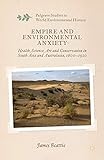Empire and environmental anxiety : health,science, art and conservation in South Asia and Australasia, 1800-1920 / James Beattie
Material type: TextPublication details: New York : Palgrave Macmillan, 2011Description: xv, 320p. 22cmISBN:
TextPublication details: New York : Palgrave Macmillan, 2011Description: xv, 320p. 22cmISBN: - 9780230553200
- Environmental policy -- Australasia -- History -- 19th century
- Environmental policy -- South Asia -- History -- 19th century
- HISTORY / Asia / India & South Asia
- HISTORY / Australia & New Zealand
- HISTORY / Modern / 19th Century
- HISTORY / Modern / 20th Century
- Imperialism -- Australasia -- History -- 19th century
- Imperialism -- South Asia -- History -- 19th century
- Public health administration -- Australasia -- History -- 19th century
- Public health administration -- South Asia -- History -- 19th century
- Science and state -- Australasia -- History -- 19th century
- Science and state -- South Asia -- History -- 19th century
- 333.70954 BEA
| Item type | Current library | Call number | Status | Date due | Barcode | Item holds | |
|---|---|---|---|---|---|---|---|
 Book
Book
|
Calcutta | 333.70954 BEA (Browse shelf(Opens below)) | Available | IIMC-134651 |
Browsing Calcutta shelves Close shelf browser (Hides shelf browser)

|

|

|

|

|

|

|
||
| 333.70951 WOR Clear water, blue skies : | 333.70951 WUF China's global quest for resources : | 333.70951 ZHA Energy and environmental policy in China : | 333.70954 BEA Empire and environmental anxiety : | 333.70954 BHA Environmental economics : | 333.70954 CHO Handbook of environmental economics in India / | 333.70954 CHO Handbook of environmental economics in India / |
The book offers a fascinating new interpretation of imperialism and environmental change, revealing the anxieties imperialism generated through environmental transformation and interaction with unknown landscapes. Demonstrating that systematic deforestation accompanied anxieties about human-induced climate change, soil erosion, and a looming timber famine, the book illuminates colonial fears about the power of environments - and environmental change - to affect health. It examines colonial concerns about the ugliness of urban environments and attempts at improving their appearance, but it also argues that some of the conservation policies and bureaucracies that resulted from expressions of environmental anxiety represented a form of imperial control designed to generate revenue and to enable the more efficient exploitation of resources
There are no comments on this title.

